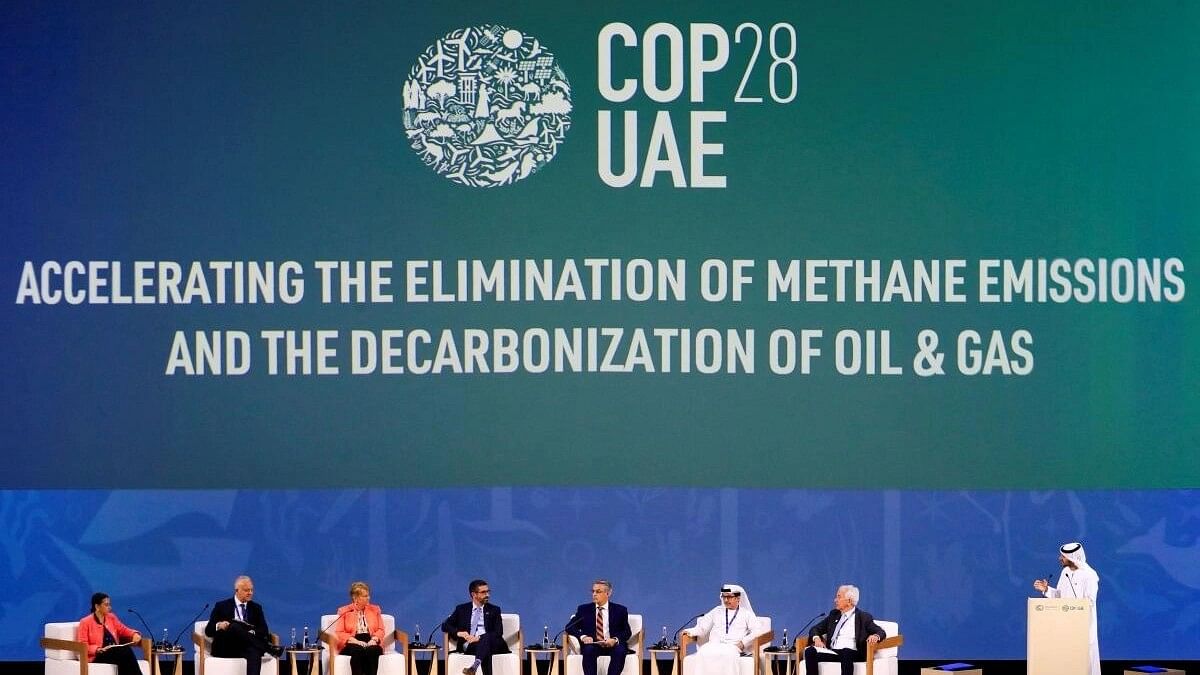
Panellists at the opening ceremony for Energy Day during the United Nations Climate Change Conference COP28 in Dubai.
Credit: Reuters File Photo
Dubai: The first week of the COP28 global climate talks concluded with a significant milestone with the operationalisation of the Loss and Damage Fund, pledges of over $83 billion and the draft text for Global Stocktake mentioning phasing out of all fossil fuels for the first time in years.
However, even as over $83 billion was mobilised in pledges, questions persist about the voluntary nature of these commitments and the actual fulfilment by the participating nations.
Amidst the discussions, the issue of fossil fuels emerged as a focal point, with a new draft text of the Global Stocktake proposing options for the phase-out of unabated coal and an orderly and just transition away from fossil fuels which might be a contentious point for India.
At last year's climate conference, India had proposed to phase down all fossil fuels and not just coal. New Delhi's call was supported by several countries, including the European Union.
India even skipped signing the pledge to commit to tripling the global renewable energy capacity by 2030 over this.
Over the reduction of greenhouse gases, India also refrained from signing the COP28 Declaration on Climate and Health.
The Global Stocktake, released on Tuesday, represented the first periodic review of global efforts to limit temperature rise to 1.5 degrees Celsius.
India, representing the BASIC bloc, played a prominent role in advocating for accountability. It emphasised the necessity for the Global Stocktake to consider the failures of developed nations.
Delegates from the BASIC grouping, comprising Brazil, South Africa, India, and China, voiced concerns about the fragmented multilateralism of developed nations during preliminary negotiations, sources said.
Despite initial challenges in substantive negotiations, the first week of COP28 witnessed a flurry of pledges.
An analysis by independent science-based assessment Climate Tracker revealed historic declarations on food systems transformation, health, renewable energy, and efficiency, along with initiatives to decarbonise heavy-emitting industries.
Key pledges and declarations included a groundbreaking agreement to operationalise and capitalise funding for Loss and Damage, with an impressive $726 million already pledged.
Additionally, efforts were made to replenish the Green Climate Fund (GCF) with $3.5 billion, bringing the total to $12.8 billion.
Contributions of $133.6 million to the Adaptation Fund, $129.3 million to the Least Developed Countries Fund, and $31 million to the Special Climate Change Fund were also announced.
The UAE further committed $200 million to help vulnerable countries through Special Drawing Rights (SDRs) and $150 million to fund water security solutions.
International financial institutions joined the effort, with the World Bank announcing an annual increase of $9 billion for 2024 and 2025 to finance climate-related projects. Multilateral Development Banks (MDBs) collectively pledged over $22.6 billion toward climate action.
As COP28 transitions into its second week, anticipation builds for increased progress in substantive negotiations, with the hope that the momentum generated by substantial financial pledges will translate into meaningful actions to address the global climate crisis.
The COP28 negotiations will continue till December 12.